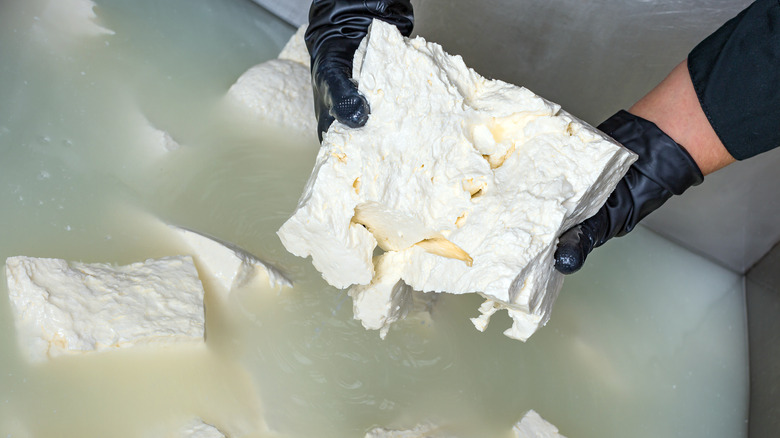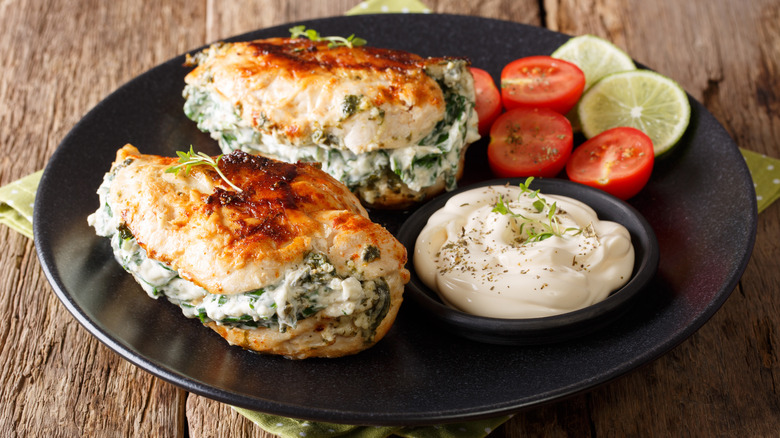Why You Should Start Marinating Chicken In Feta Cheese
We may receive a commission on purchases made from links.
Chicken is a user-friendly and mild-tasting meat, so it pairs well with various flavor profiles. But like any lean meat, it's prone to drying out and becoming bland during cooking. Fortunately, it's easy to avoid a disappointing outcome with a marinade or brine. Cooks Illustrated explains that brining infuses flavor and locks in moisture because the salt restructures the proteins in chicken and permits them to absorb more water. You've probably heard of many interesting brine methods by now, some likely including pickle juice, kimchi, tea, and bourbon. But what about feta cheese and the liquid it comes in?
MasterClass describes feta as a low-fat, tart Greek cheese that can be made with cow's, goat's, or (to keep with tradition) sheep's milk — white, easily crumbled, and intensely saline. This is because it's dry-salted and both aged and packaged in brine. The brine — a mixture of salt and water — helps keep the cheese moist, MasterClass adds. While it might be tempting to drain off and discard the brine when cooking with feta, please don't do it! You'll be cheating yourself out of a useful ingredient that can brighten grains, dressings, and broths — and create mouthwatering poultry.
The solution for tender, flavorful chicken
Cooks Illustrated says that table salt is the best for brining because of how easily it dissolves — but feta brine's already a solution, so it's thoroughly salty and ready to use immediately. But you can also utilize the cheese itself in all its creamy glory. The New York Times's feta-brined roast chicken calls for a blended mixture of feta, salt, and water to coat the chicken, and Better Homes & Gardens' grilled feta-brined chicken recipe uses feta, water, herbs, and spices. Lifehacker praises feta-caper chicken marinade, which is a great way to use up the capers hanging out in your fridge.
Balanced Bites' garlicky feta-brined chicken thighs recipe reminds us to freeze any leftover feta brine you're not using immediately and suggests blending feta with water and salt if you don't have much of the liquid around. A vacuum-sealed bag is best for long-term storage here — just don't forget to label it because you might not remember that you froze feta brine down the line, and the frozen mystery liquid might have you wondering.
A feast of feta
If you're excited to try feta-brined chicken, we can hardly blame you — but don't rob the cheese of its brine unless you're ready to use them both. MasterClass warns home cooks that feta can become dry even under refrigeration, so if you're not using it within seven days, let it bathe in its brine, or if you can't wait, replace the liquid with salted milk and get marinating. Since feta is already salty and high in sodium (per MasterClass), be prudent about salting your feta-fied food for taste.
Feta itself also makes a delicious topping or accompaniment for chicken. If you've got some of the cheese left, why not use it in Mediterranean chicken thighs with potatoes, peppers, and feta (via Valerie Bertinelli)? Or Food Network's grilled chicken with balsamic syrup and crumbled feta? It's a perfect balance of sweet and salty. Now that you know how to use feta brine instead of pouring it out — what other inventive ingredients await you?


